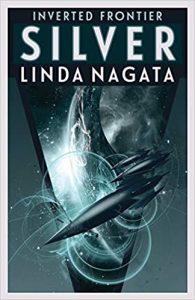Russell Letson Reviews Silver by Linda Nagata
 Silver, Linda Nagata (Mythic Island 978-1937197285, $19.00, 414 pp, tp) November 2019. Cover by Sarah Anne Langton. [Order from Mythic Island Press, PO Box 1293, Kula HI 96790; <mythicislandpress.com>.
Silver, Linda Nagata (Mythic Island 978-1937197285, $19.00, 414 pp, tp) November 2019. Cover by Sarah Anne Langton. [Order from Mythic Island Press, PO Box 1293, Kula HI 96790; <mythicislandpress.com>.
Linda Nagata has also been revisiting old territory, turning from the near-future military-SF of the Red trilogy and The Last Good Man to the very far future of the Nanotech Succession books of the 1990s. Her new sequence builds on Deception Well and Vast and also integrates the previously free-standing world of Memory. The new series name, Inverted Frontier, signals the direction of the action: from the world of Deception Well, at the farthest fringe of human interstellar expansion, a group of post-humans decides to travel back toward the centers of civilization to discover the fate of the worlds they fled when the ancient-alien Chenzeme planet-wreckers ravaged human space. In the first volume, Edges, the expedition is nearly destroyed by an encounter with Lazuri, the remnant persona of a potent post-human exile bent on regaining his godlike status. The sequel, Silver, reveals that Lazuri’s goal is to retake and remake the world which he helped create and from which he was exiled: the ringworld Verilotus, the setting of Memory.
The multi-threaded story is told from four primary viewpoints, and each thread is a journey. Riffan Naja of the Deception Well expedition is scouting ahead in search of its leader, Urban, whose last instantiation might have been finally and irreversibly killed in a running fight with Lazuri. But both Urban and Lazuri have survived and are headed for Verilotus, where the characters from Memory have their own problems. Jubilee, accompanied by her brother Jolly, is searching for her one true love, Yaphet, who she hopes has survived the planet-shaking events that climaxed in the earlier novel. The paths of Riffan, Urban, Lazuri, and Jubilee gradually converge, each story line carrying a cargo of series and individual background along with their plot components, so a re-reading of Vast and Memory is not required (though a first reading is strongly recommended, just for the pleasure of it).
The governing rules, powers, and limitations of the settings and the characters, are as engaging as the story lines. Members of the Deception Well expedition can remake their environments and their mental and physical selves – they can be embodied or virtual, singletons or copies or specially configured, dedicated-function versions of themselves (“apparatchiks”), and their starships are also endlessly reconfigurable, as long as there are sufficient material and computational resources. The inhabitants of Verilotus emerge from and return to the “silver” – the nanotechnological substrate that configures their world – in an endless cycle of reincarnation. Jubilee, Jolly, and Yaphet, though, are special cases, with special roles to play in the larger conflict that has been convulsing the planet, the aftereffects of a war between the godlike beings that created it for their own purposes.
In both realms, the distinction between mind and matter is blurred – or, indeed, perhaps nonexistent. The people of Deception Well may have tamed matter and harnessed it to their needs, but the silver of Verilotus is itself a kind of mind-matter that has lost its original orderliness – it is a sleeping mind, and the objects dotting its shifting landscape are its dreams. Its tides throw up “follies” – “objects long ago dissolved by the silver only to be returned out of place, out of time – purposeless – never the same as they used to be.” At one point, Urban sees
a solid tower of glistening white concrete that looked as if it had dripped from overhead, bit by bit, in a semi-solid state, before hardening in place. The tower stood at the center of a maze a square kilometer in size, composed of low sinuous walls of eroded gray brick.
There was a series of stunningly detailed arches carved of some opaque purple material, each a half meter high, leading nowhere.
A long, straight stretch of… road? Paved in a polished, gold-veined brown stone. It went nowhere too.
Especially tantalizing are the books that can appear embedded in a wall or rock face, “brought forward in time” with pages “changed into stone or metal,” still readable but sometimes in long-vanished languages or with the information garbled. Reading – of old books, of the silver, ultimately of the world itself – is crucial to each quest or pursuit.
Verilotus and its denizens and the shape and scale of the conflict feel magical and mythic. But everyone understands that this strange planet is an artifact and that the silver is material rather than supernatural. Urban and Riffan use the language of material science: their own Makers are “tiny mechanics, the size of complex molecules… molecular tools,” and Jubilee and Jolly understand this at once – “The silver is a mechanism. A kind of machine that players once knew how to use.” So the goal of each major character is to read and then rewrite and reset the world by reconfiguring the codes of the silver and even of the self. Nevertheless, the aura of magic and of shifting dreamscapes persists, pointing to the deep connections between science fiction and fantasy. Silver is a kind of narrative solvent that dissolves the superficial differences between genres and recasts them into a substance that satisfies the dreaming and analytical sides of the reading mind. It also opens an already vast story space to even greater expansion, while providing a satisfying conclusion to its particular chapters of the tale.
Russell Letson, Contributing Editor, is a not-quite-retired freelance writer living in St. Cloud, Minnesota. He has been loitering around the SF world since childhood and been writing about it since his long-ago grad school days. In between, he published a good bit of business-technology and music journalism. He is still working on a book about Hawaiian slack key guitar.
This review and more like it in the February 2020 issue of Locus.
 While you are here, please take a moment to support Locus with a one-time or recurring donation. We rely on reader donations to keep the magazine and site going, and would like to keep the site paywall free, but WE NEED YOUR FINANCIAL SUPPORT to continue quality coverage of the science fiction and fantasy field.
While you are here, please take a moment to support Locus with a one-time or recurring donation. We rely on reader donations to keep the magazine and site going, and would like to keep the site paywall free, but WE NEED YOUR FINANCIAL SUPPORT to continue quality coverage of the science fiction and fantasy field.







